Proton VPN Review: Quick Expert Summary
Proton VPN has excellent security, top-notch privacy features, and a really simple interface, and it maintained fast speeds in all of my speed tests. It protects user data with 256-bit AES encryption, advanced server architecture, a strict no-logs policy, a kill switch, and much more. It also has apps for all major platforms, Apple and Android TV, and browser extensions for Chrome and Firefox, and it allows 10 simultaneous connections on a single account.
Proton VPN also has:
- Dedicated servers for torrenting — Works with all major torrenting clients like uTorrent, BitTorrent, qBittorrent, and Vuze.
- Split-tunneling — Allows you to route some of your internet traffic through the VPN and some through your local network.
- NetShield — Blocks ads, tracking sites, and malicious websites.
- VPN Accelerator — Uses state-of-the-art technology to increase VPN speeds while connected to distant servers.
- Open-source apps — Anyone can check the source code for Proton VPN’s apps to make sure they’re safe to use. Proton VPN’s apps have also been independently audited and verified.
- Full leak protection — Proton VPN provides full protection against IPv6, DNS, and WebRTC leaks.
- Tor over VPN — Lets you access the Tor privacy network using regular web browsers, like Chrome and Firefox.
- Proton Pass — A great password manager that’s separate from the provider’s VPN app.
- Secure Core Servers — Lets you route your traffic through 2 servers instead of 1.
- Stealth — Proton VPN’s obfuscation tool that makes your traffic appear as normal traffic, allowing you to bypass network firewalls.
- And a lot more…
Proton VPN is a great VPN, but there are a couple of things that need improvement. For starters, Proton VPN doesn’t work well in restrictive countries — so if you live in a country that restricts the internet, Proton VPN isn’t a good option (ExpressVPN is the best for that). I’d also like to see Proton VPN include access to a smart DNS for devices that don’t support VPNs, allow non-premium users access to live chat, and respond to customer support emails quicker.
Proton VPN has a really good free plan and monthly and yearly subscription plans that come with a prorated 30-day money-back guarantee.
| 🏅 Overall Rank | #9 out of 82 VPNs |
| 🌍 Number of Countries | 112 |
| 📱 Number of Devices | 10 |
| 💸 Starting Price | $3.59 / month |
| 🎁 Free Plan | ✅ |
| 💰 Money-Back Guarantee | 30 days (prorated) |
Proton VPN Full Review — Excellent For Online Privacy
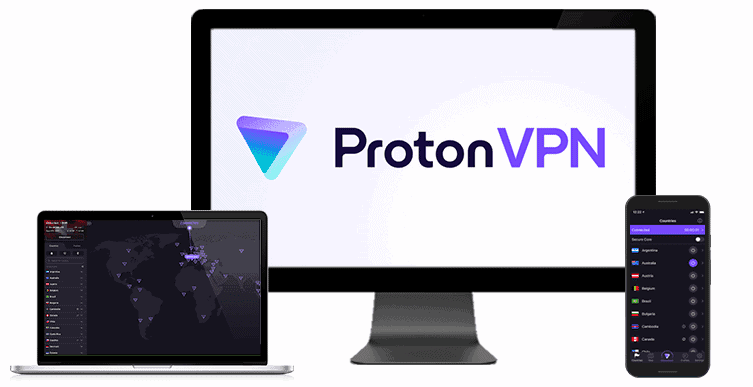
I spent a few weeks testing and researching Proton VPN to see how it compares to other top VPNs, and I can safely say it’s a good, privacy-focused provider.
Proton VPN has a reputation as being a high-privacy VPN, coming from the same company that makes the ultra-secure, encrypted email service Proton Mail.
And this VPN really does have lots of high-privacy features, along with intuitive user apps, strong streaming and torrenting capabilities, and very fast connection speeds.
Proton VPN Plans & Pricing — Reasonably Priced Plans + Good Free Plan

Proton VPN has a free plan as well as several paid plans that come with the same features and only differ in the subscription length.
Proton VPN Free allows for 1 device and provides access to servers in 5 countries (in the US, Japan, the Netherlands, Romania, and Poland). I really like how the free plan gives you unlimited data (unlike other free plans that place a limit on data), but you don’t get to choose the server you want to connect to — Proton VPN automatically connects you to the fastest. Also, you don’t have access to Plus servers for streaming, dedicated torrenting servers, or NetShield.
Proton VPN’s Plus plan allows 10 simultaneous connections, access to all servers in 112 countries, includes access to the Plus servers for streaming, dedicated torrenting servers, Secure Core servers, Tor servers, and NetShield. Starting at $3.59 / month, the Plus plan is available for a 1-month, 1-year, and 2-year subscription.
All Proton VPN premium plans are backed by a 30-day money-back guarantee, but I don’t like that Proton VPN’s money-back guarantee is prorated. This means that you are charged for each day that you use Proton VPN up until the 30-day deadline. So, if you cancel Proton VPN after using it for 15 days, you will only receive a 50% refund — not a 100% refund like most every other competitor offers (like ExpressVPN and Private Internet Access). Regardless, in the grand scheme of things, you’re still not going to be charged a lot of money.
Proton VPN accepts payment via a bank transfer, credit cards, Paypal, Bitcoin, and cash. I actually really like that Proton VPN accepts cash as a payment method, as it provides excellent privacy — plus, top competitors like ExpressVPN, Private Internet Access, and CyberGhost VPN don’t accept cash payments.
Overall, there are much cheaper VPN options than Proton VPN on the market — for example, CyberGhost VPN includes similar features, faster speeds, a 45-day 100% money-back guarantee, and costs less. But if you’re looking for a VPN that places a heavy emphasis on security and privacy, Proton VPN is a very good value.
Learn more about Proton VPN’s pricing
Proton VPN Features — Includes Essential & Advanced Security Features
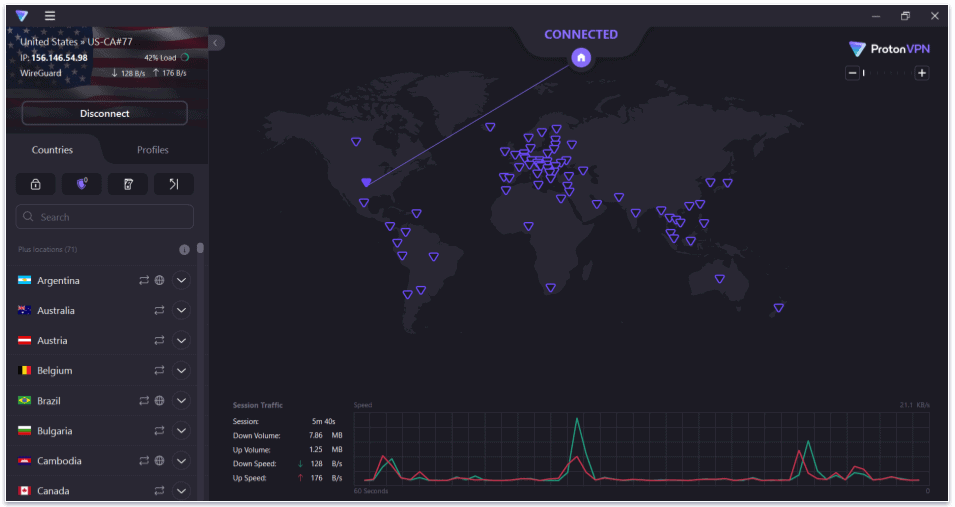
Proton VPN includes all of the essential VPN privacy features, like:
- 256-bit AES encryption. This is one of the strongest encryption algorithms in the world (sometimes called “military-grade” encryption).
- No-logs policy. Proton VPN doesn’t keep logs of personal information or online activity.
- Kill switch. This feature automatically disconnects you from the internet if your VPN connection fails. Proton VPN’s in-app kill switch is only available on iOS, Linux, macOS, and Windows, but there is an option to enable it from the app on newer Android models, too.
Proton VPN also has a few advanced security features, like:
- Perfect forward secrecy. This changes your encryption key each time you connect to a Proton VPN server, so if one encryption key is compromised, only the data on that one key is vulnerable (and not any past or future sessions).
- Full-disk encryption. If a Proton VPN server is compromised, disk encryption keeps all of the data on that server secure and unreadable.
Proton VPN has 4 protocols, including WireGuard, IKEv2/IPSec, OpenVPN, and Stealth. WireGuard and IKEv2/IPSec provide fast speeds and very strong security, OpenVPN has decent speeds and really good security, and Stealth is the provider’s proprietary protocol that provides obfuscation, which hides your VPN traffic. There’s also a Smart protocol option that automatically picks the best protocol for your network.
| Android | iOS | Windows | macOS | Linux | Apple TV | |
| WireGuard | ✅ | ✅ | ✅ | ✅ | ✅ | ✅ |
| IKEv2/IPSec | ❌ | ❌ | ❌ | ✅ | ❌ | ❌ |
| OpenVPn | ✅ | ❌ | ✅ | ❌ | ✅ | ❌ |
| Stealth | ✅ | ✅ | ✅ | ✅ | ❌ | ❌ |
Proton VPN also has built-in leak protection for DNS, WebRTC, and IPv6 — this is great to see, as some competitors (like Surfshark and VyprVPN) require you to manually disable IPv6 and WebRTC to avoid leaks.
Split-Tunneling — Great & Flexible Tool, but It’s Not Available on Mac
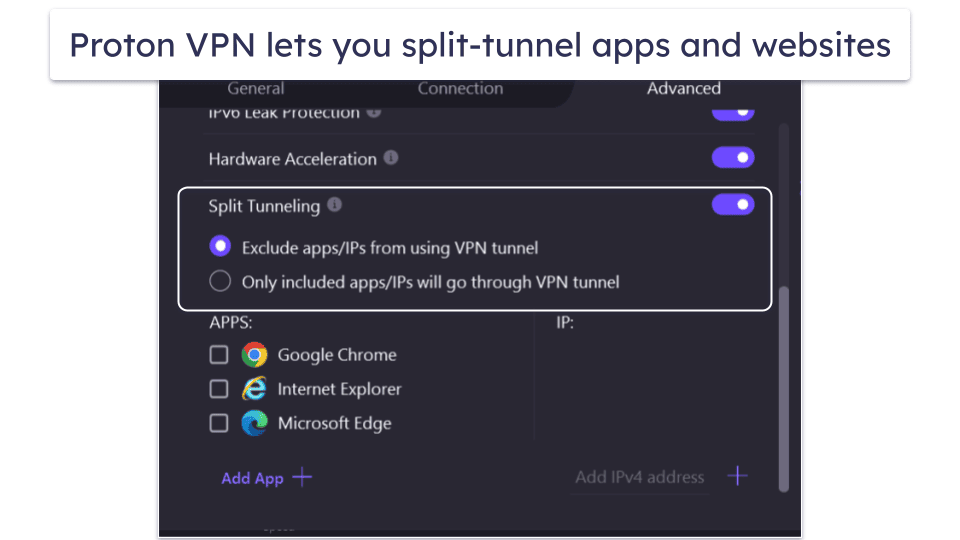
Proton VPN’s split-tunneling lets you include or exclude web browsers, apps, and IP addresses from the VPN tunnel — this is better than most competitors’ split-tunneling features (ExpressVPN only lets you redirect apps).
However, like most other VPNs, Proton VPN also supports split-tunneling on Windows and Android only — I’d love to see Proton VPN add split-tunneling to the Mac or iOS app, but considering that very few competitors provide this feature for Apple users (ExpressVPN has split-tunneling for macOS 10.15 and below, and Private Internet Access supports split-tunneling on macOS 11), I can’t say this is a dealbreaker.
The split-tunneling feature works as promised. I tested it by connecting to a US dedicated P2P server and excluding my Chrome browser traffic from the VPN tunnel, and it did exactly what it was supposed to. Plus, it ended up increasing both my browsing and torrenting speeds.
Overall, Proton VPN’s split-tunneling feature is really good — it does what it says it does, there are no glitches, and it’s easy to set up.
NetShield — Blocks Ads & Dangerous Websites
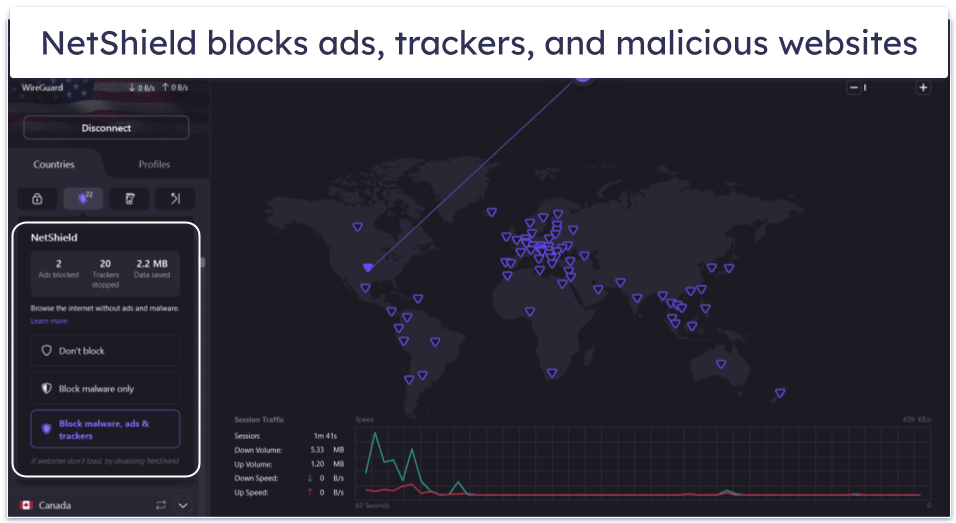
NetShield blocks ads, trackers, and malicious sites. I tested this feature by visiting websites that are usually littered with ads — NetShield blocked every single ad. These websites were then much less cluttered and even loaded a little faster because there were no more ads. NetShield performing so well is not surprising, seeing as how it’s actually ranked on our list of the best VPN ad blockers.
I really like Proton VPN’s NetShield tool. It’s better at blocking ads than CyberGhost VPN’s ad blocker. In my tests, it always blocked all shady HTTPS sites I tried to visit. It’s also pretty convenient that you can customize it — for example, you can set it up to block malware only and not ads.
NetShield is no doubt one of Proton VPN’s best security extras — it doesn’t have the full-featured phishing protection that many antiviruses have, but it blocked all ads and pop-us and prevented me from visiting malicious and tracking websites.
VPN Accelerator — Boosts Speeds on Distant Servers

Proton VPN has a speed-boosting feature called VPN Accelerator, which increases your connection speeds on distant servers (my speeds were essentially unchanged on local servers). It’s available on all of Proton VPN’s apps, and it’s easy to find (under the Connection tab in the Settings menu) and easy to turn on (with one click).
VPN Accelerator uses state-of-the-art technology that reduces latency, bypasses congestion on the internet, and shortens the delivery of packet information to improve speeds by up to 400%, according to Proton VPN’s website, where you can also find more detailed and technical definitions of how the feature works. But if you aren’t tech-savvy or don’t understand very in-depth internet connection speed processes, all you really need to know is this — VPN Accelerator works!
In my tests, VPN Accelerator provided me with faster speeds than I had without VPN Accelerator on servers located in North and South America and Asia (I’m located in North Macedonia). For example, here are my speeds with and without the feature while connected to the same server in the US.

My download speeds, ping, and upload speeds all improved by at least 10% when I enabled VPN Accelerator. With the feature, websites loaded in 1 second and videos started in about 2 seconds. However, when I turned off the feature, the same websites loaded in 3 seconds and videos began playing in about 4-5 seconds.
Overall, I really like VPN Accelerator — it’s easy to use, it actually works as it’s intended, and I’m not aware of any other provider that has a similar feature.
Secure Core — Adds an Extra Layer of Privacy

Proton VPN’s Secure Core server architecture passes your data through 2 servers before it leaves the Proton VPN network. This way, if a third party hacks the final destination server, it will only be able to trace your connection back to the Secure Core server (and not your device). Proton VPN’s Secure Core servers are based in underground data centers in Switzerland and Sweden, and also on a former military base in Iceland. Plus, they’re fully owned, built, and transported to these safe locations from Proton’s offices.
Secure Core is similar to a double VPN connection — but double VPN connections bounce your data through 2 normal servers in 2 random countries while Secure Core routes your traffic through 2 Secure Core servers, including 1 hyper-secure server that’s in an ultra-secure location, thereby providing even stronger protection.
Routing your traffic through 2 servers will naturally slow down your speed more than when you’re connected to just one server — when I manually connected to a Secure Core server, websites took 3–4 seconds to load. But Secure Core servers are still faster than most competitors’ double VPN features (Perfect Privacy’s double VPN connection took me an average of 10 seconds for websites to load).
I only recommend using this feature if you’re looking to take extra measures to keep your online identity anonymous or if you’re in a high-risk country that may monitor your internet traffic. Even still, Proton VPN’s Secure Core is an excellent privacy feature that is not available with many other VPNs.
Stealth — Proprietary Protocol Masks Your VPN Connection
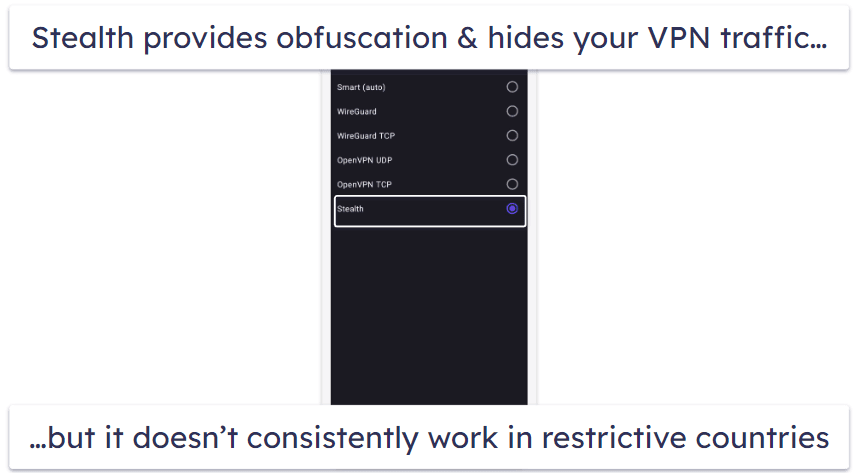
Stealth is Proton VPN’s proprietary protocol, which provides obfuscation, meaning it hides VPN traffic and makes it look like regular internet traffic. Stealth is only available on Android, iOS, Windows, and macOS. It’s great for hiding your VPN connection while connected to a network that uses a firewall to block VPNs, such as at a school or a company office.
The protocol is easy to enable and is also optimized for high performance — especially since you can use it together with the VPN Accelerator feature. This is great because VPN obfuscation methods usually cause noticeable slowdowns. In my tests, my VPN speeds were only 15–20% slower when I used the Stealth protocol, which is pretty good.
Stealth is good for making your VPN traffic look normal on your school’s network, but I can’t recommend that people in restrictive countries use it — the provider’s reps confirmed that the Stealth protocol doesn’t work in China, and they also said they can’t guarantee it will 100% work in other restrictive countries. If you need a VPN for these countries, I recommend ExpressVPN or Private Internet Access instead, as they both work in restrictive countries without any issues.
Overall, Proton VPN’s Stealth protocol provides obfuscation and is good for bypassing VPN blocks at your school or office, but it unfortunately doesn’t consistently work in restrictive countries.
Alternative Routing — Improves Access to the VPN
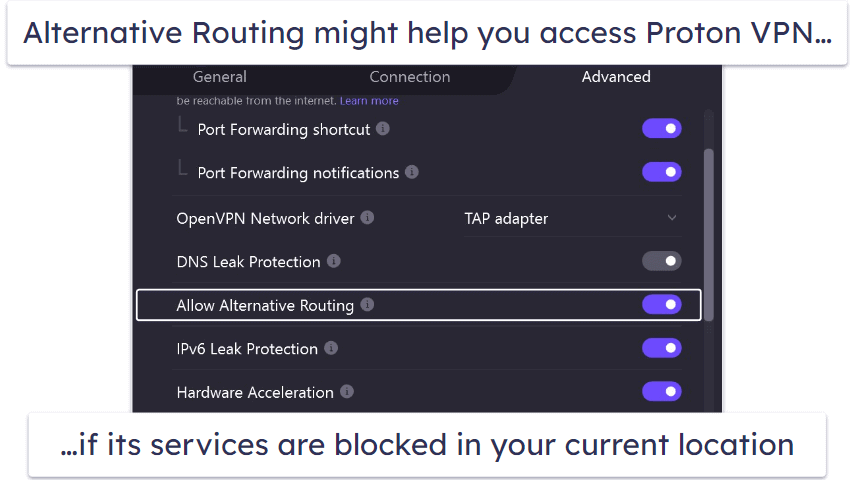
Alternative Routing should help you connect to Proton VPN’s service if it’s blocked. The feature does that by trying alternative third-party routing methods that are unlikely to be blocked, such as Amazon Web Services (AWS). Alternative Routing is available on iOS, Android, Windows, and macOS.
While Alternative Routing is simple to enable, it doesn’t work very well in restrictive countries — Proton VPN’s support reps told me that even with Alternative Routing enabled, the VPN doesn’t work in China, and it only maybe works in other restrictive countries. If you need a VPN that works well in these countries, I recommend ExpressVPN.
Proton Pass — Stores Your Passwords in a Secure Vault (& Creates Email Aliases)
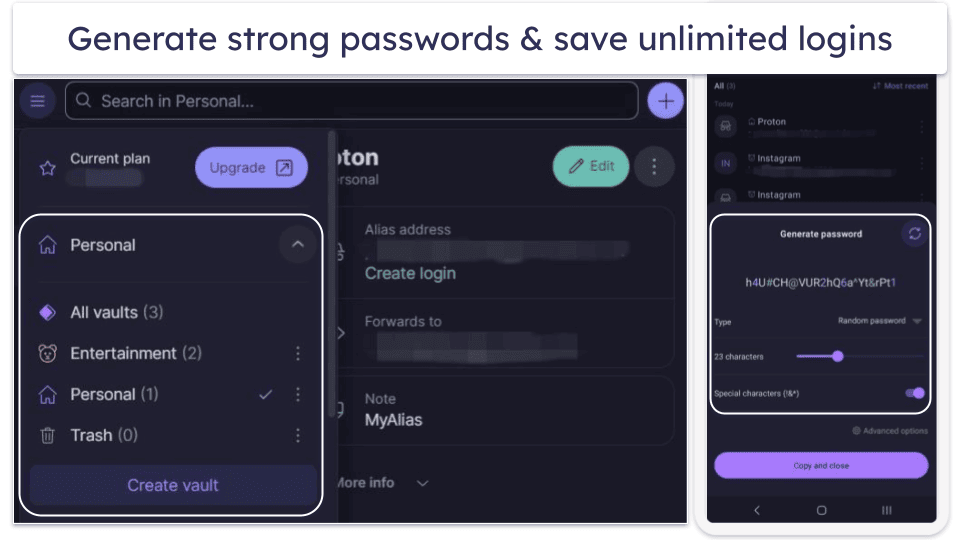
Proton Pass is a secure password manager that comes with industry-standard features, like password generation and an auto-filling feature, plus a couple of extra useful features. Proton Pass is separate from the VPN app — it has a dedicated app for Android and iOS, and browser extensions for Chrome, Edge, Firefox, and Brave. It comes with a paid plan and a pretty good free version.
I really like the password generator in the app. It lets you create either “Memorable” passwords, which include a combination of words and numbers, or “Random” passwords, which combine letters, numbers, and symbols. You can adjust these passwords further by setting the number of words or characters, or picking the type of word separator for memorable passwords (like full stops, for example).
I also think the autofill feature is great. It worked well on every app I tested on my phone, but it didn’t always work on some sites on my desktop. That said, I do like that it’s very intuitive to set up and simple to use — the only thing I had to do was choose the credentials I needed, which I did in just 1 click.
One of my favorite Proton Pass features is its ability to create email aliases — a randomly-generated email address that helps hide your real email address. This feature allows you to avoid sharing your real email address when filling out online forms, which can help protect your email from being part of an online leak or being shared with third parties.
Proton Pass also includes an integrated 2-factor authentication (2FA) authenticator. It stores your 2FA codes and automatically displays and auto-fills them, which is very convenient.
Proton Pass is very secure. Like all Proton products, it passed independent security audits, and it’s open-source, which means anyone can verify that the encryption works as described. Also, all information you add to the app is protected by end-to-end 256-bit AES encryption.
Overall, Proton Pass is an impressive tool. The only other VPN that offers a similar password manager is ExpressVPN, but its ExpressVPN Keys tool doesn’t let you create email aliases or come with 2FA authenticator feature (however, ExpressVPN Keys is included with your VPN subscription). That said, both Proton Pass and ExpressVPN Keys are missing important features that the best password managers have, like password security auditing, emergency access, and dark web monitoring.
Tor over VPN — Dedicated Servers for Browsing Tor on Your Browser
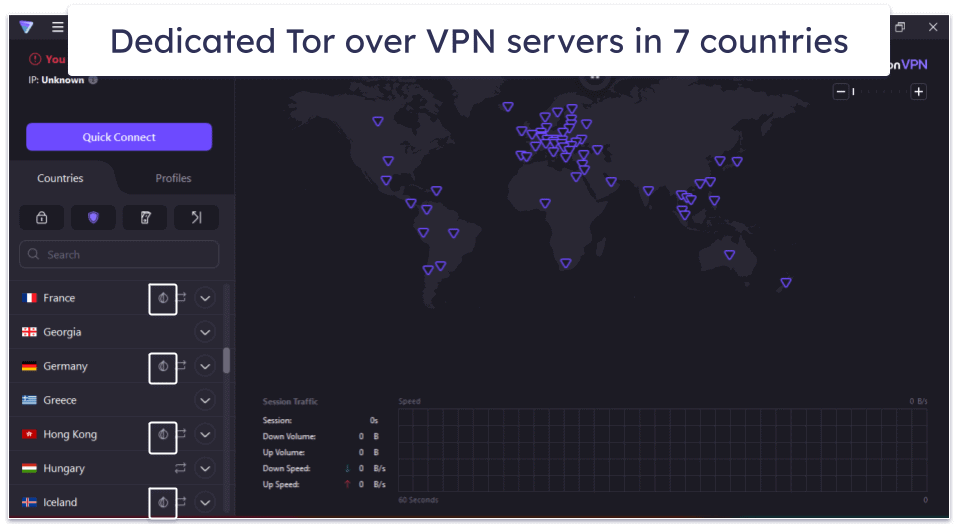
Proton VPN supports The Onion Router (Tor) over VPN on designated servers located in the US, France, Germany, Sweden, Switzerland, Iceland, and Hong Kong.
I like how easy it is to use Tor over VPN with Proton VPN. All that you need to do is connect to one of Proton VPN’s Tor servers (identified by a “-TOR” suffix and an onion icon next to the server), and then all of your traffic is automatically routed through the Tor network.
This lets you surf on your own browser, like Chrome and Firefox even more securely without having to download the Tor browser. The one drawback is your internet speed slows down significantly (because it encrypts your traffic several times) while connected to the Tor network — it took me more than 15 seconds for websites to load.
You can also visit .onion sites this way, but you’ll have to configure your browser to properly resolve onion domains. The process can be a bit tricky, but Proton offers easy-to-follow step-by-step guides for all browsers on its website.
Overall, Proton VPN’s Tor over VPN is an easy and quick way to access the Tor network. Most users won’t need this tool (Proton VPN’s regular servers are secure for normal browsing, streaming, and torrenting), but it’s an excellent (and very convenient) option for those who do need it.
Proton VPN Privacy & Security — Transparent & Verified Policies + Features
Proton VPN is based in Switzerland, which has some of the toughest data privacy laws in the world. Switzerland also doesn’t have any mandatory data retention laws, and it isn’t a part of the 5/9/14 Eyes Alliances (a group of nations that have agreed to share intelligence data).
Proton VPN also has a strict no-logs policy — it only collects your email address (for communication purposes), payment details (like your name and partial info), and a timestamp of the last login attempt (but it doesn’t include any identifiable information). To remain more anonymous, you can pay with cash or Bitcoin.
I also like how Proton VPN’s no-logs policy has been independently audited and confirmed by an independent third-party — competitors like ExpressVPN have also undergone third-party audits to confirm their privacy policies, and Private Internet Access has even had its no-logs policy tested and confirmed in court (multiple times).
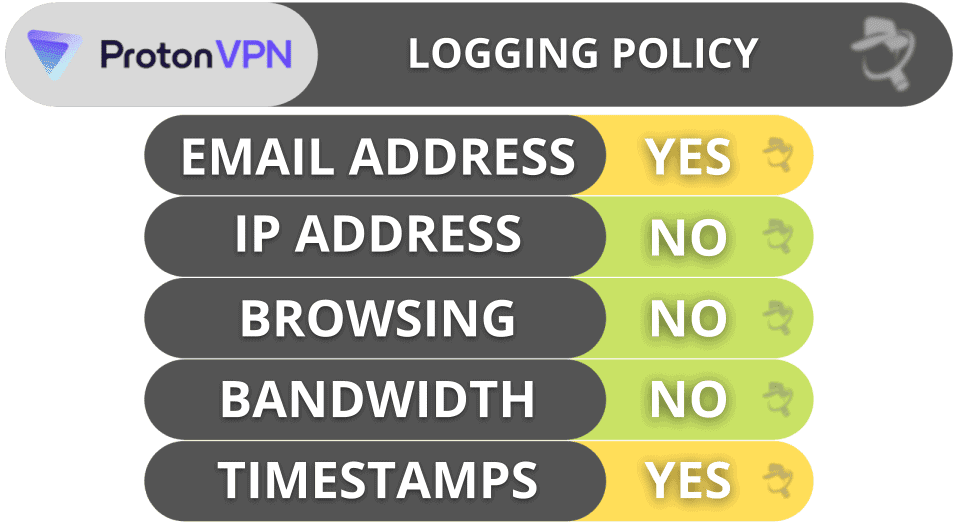
I really like that all of Proton VPN’s apps are open-source. This means anyone can investigate Proton VPN’s security. Plus, all of Proton VPN’s apps have been independently audited and verified for vulnerable security risks (the audits found only “medium” and “low” risks that Proton VPN quickly resolved) — I think this is really great because most people don’t have the technical background to audit the apps’ code themselves. Private Internet Access also has open-source apps, but they haven’t been audited like Proton VPN’s apps.
Proton VPN also issues transparency reports that detail all of the requests it receives for user data (from law enforcement and government agencies). When you look at these reports, you may notice large gaps in between the dates each report is published, but this is because Proton VPN rarely receives user data requests.
Overall, Proton VPN has a transparent no-logs policy, is headquartered in a country with strict data privacy protection laws, and has open-source apps that have been audited and confirmed to be safe.
Proton VPN Speed & Performance — Maintains Blazing-Fast Speeds on All Servers
I conducted speed tests for a server in each of the 112 countries where Proton VPN has a server to find the average VPN speed using VPN Accelerator — and my average decrease in speed was 20%, which is above average.
Overall, Proton VPN had very good speed on local servers (I’m located in North Macedonia) as well as distant servers in North and South America, as well as Africa and Asia. I maintained really good speeds for browsing, watching videos, gaming, and torrenting on nearby servers, and I had a similar experience when I connected to a distant server in Australia.
I first ran a speed test connected to my local internet service provider (ISP) to get a baseline of my internet speed.

Then, I clicked on Proton VPN’s Quick Connect tool (that finds the fastest server) and was connected to a nearby server. My download speed actually increased by 29%. Although my ping slightly increased, I was able to surf the web, watch videos on YouTube, and share files with no noticeable delay.
In fact, it felt as if I wasn’t even connected to a VPN.
Next, I connected to a Proton VPN server in the US. My ping (the time it takes for the internet signal to travel from the device to the VPN server) significantly increased, but my download speed slightly decreased (yet, it was still faster than my connection without a VPN in North Macedonia). Websites loaded almost instantly, and I still downloaded large files at fast speed.

Finally, I connected to a Proton VPN server in Australia, which is one of the farthest servers from my location, and I experienced slightly slower browsing speeds — my download speeds decreased by about 19% from what it was in the US). Websites averaged about 3-4 seconds to load.
Overall, Proton VPN has some pretty fast speeds to support almost any online activity. I maintained great speeds when I connected to servers in North Macedonia (my home country), and Proton VPN still provided me with sufficient speeds on distant servers to watch videos and share P2P files. That said, Proton VPN still isn’t as fast as ExpressVPN, but it is one of the fastest VPNs in 2024. If you’d like to compare other features of the two VPN services, check out our comparison of Proton VPN and ExpressVPN.
Proton VPN Servers & IP Addresses — Offers a Huge Network + Speed Metrics

Proton VPN has servers located in 112 countries. Some top VPNs have similar server coverage (CyberGhost VPN has servers in 100 countries, and ExpressVPN in 105 countries). But Proton VPN’s server network is way bigger than other competitors, such as PrivateVPN (200+ servers in 63 countries). While most of Proton VPN’s servers are located in the US and Europe, it has servers in Central and South America, Africa, Asia, and Australia — so you’ll be able to connect to a nearby server no matter where you live.
It’s also great that Proton VPN allows you to pick individual cities to connect to — that way, you can pick the city that’s closest to your location to get good speeds.
Most of Proton VPN’s servers are physical servers, meaning they’re physically located in the country that you’re connected to, but there are also virtual servers, which Proton calls Smart Routing servers, that are located in a different country than the one you connect to. I like how these servers are clearly labeled in the app with a globe icon and if you want to find out where these servers are actually located, you can check the full list on Proton’s website.
Plus, Proton VPN displays the server load, which shows how many active users are connected to a server — that makes it very easy to find the fastest servers. I always had faster speeds while connected to servers with low load than servers with high load. Top competitors like ExpressVPN and TunnelBear don’t have this metric.
I really like Proton VPN’s Plus servers that are designed for working with streaming sites. I rarely had a problem streaming content on my favorite sites while I was connected to a Plus server (Proton VPN’s free servers don’t support streaming, so you’ll need to upgrade to the premium plan to get access to the Plus servers). If you want to torrent, Proton VPN has dedicated P2P servers located in 59 countries.
You can use any one of Proton’s 112 servers as an exit server while enabling Secure Core servers, and Proton VPN will connect you to the Tor network with one click on its Tor Over VPN servers in the US, France, Germany, Iceland, Sweden, Switzerland, and Hong Kong.
Overall, Proton VPN has a good server network, it displays the server load, and it has servers for streaming, torrenting, and connecting to the Tor network.
Proton VPN Streaming Support — Accesses All Popular Streaming Services
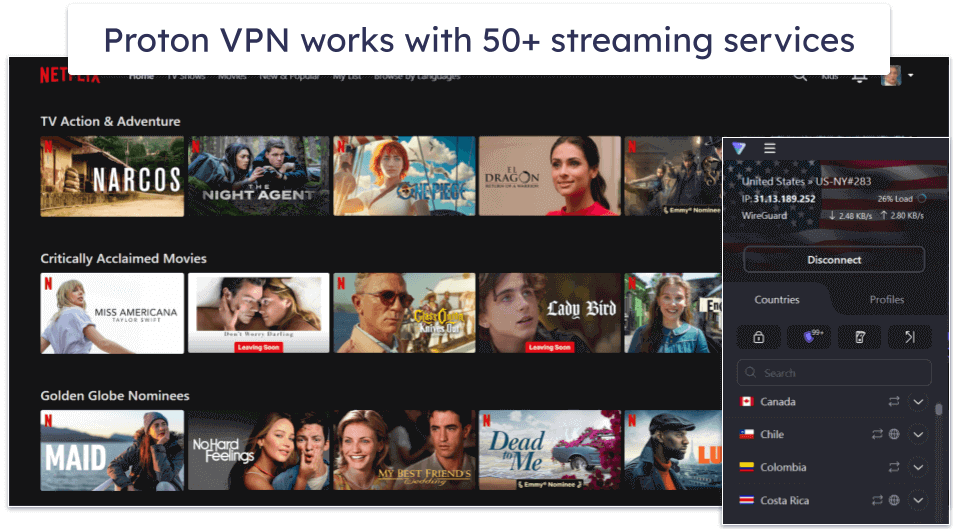
I think Proton VPN is good for streaming because it works with 50+ streaming apps (including both popular and small streaming platforms). Proton VPN’s free plan doesn’t support streaming, so you’ll need to get a paid subscription to get access to the Plus servers, which are optimized for streaming.
Proton VPN is also a good Netflix VPN because it reliably works with 25+ Netflix libraries 100% of the time. In addition to Netflix, Proton VPN works with other top streaming sites like Max, Amazon Prime, Disney+, and BBC iPlayer, as well as DAZN, ABC, NOW TV, Peacock, Fubo, and Pluto TV. I really like that Proton VPN lists the streaming sites it works with in its support articles, as that provides a fast way to find out if the VPN is compatible with a particular streaming app.
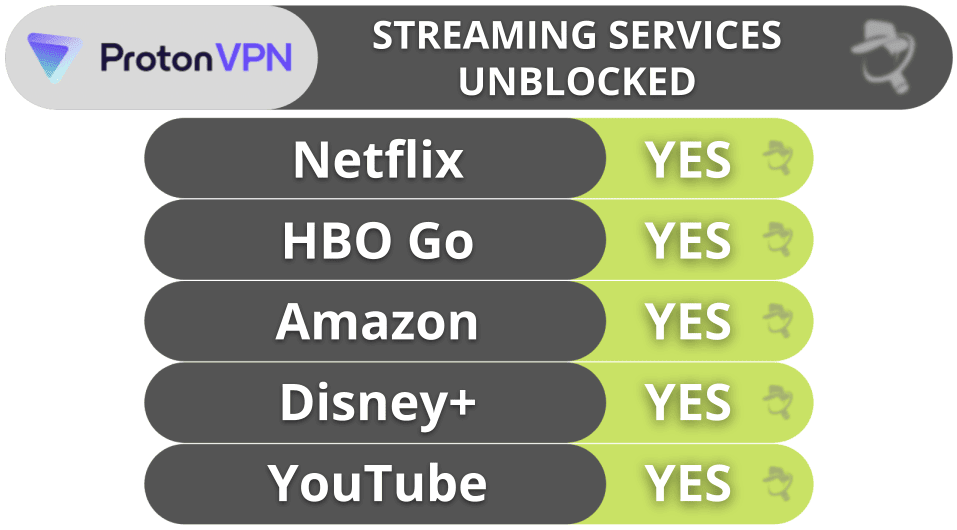
Unfortunately, Proton VPN is missing a smart DNS, which is a service that works on devices that don’t natively support VPNs, like gaming consoles or certain smart TVs — top competitors like ExpressVPN, CyberGhost VPN, and Private Internet Access all provide access to a smart DNS.
On the plus side, you can manually set up Proton VPN on your router, so that all your devices (even the ones that don’t natively support VPNs) can connect to Proton VPN. And Proton VPN provides helpful tutorials that include screenshots, so the setup process is pretty straightforward — for example, it only took me about 9–12 minutes to set up Proton VPN on my router.
Overall, Proton VPN is really good for streaming — it consistently works with Netflix, and it’s also compatible with 50+ other streaming apps (including top sites like BBC iPlayer, Amazon Prime, Max, and Disney+).
Proton VPN Torrenting Support — Allows P2P Traffic on Most Servers

Proton VPN provides really good torrenting support. While it doesn’t allow P2P traffic across all servers like ExpressVPN, it supports torrenting on dedicated P2P servers that are strategically located in 59 countries around the globe, such as Iceland, Singapore, Switzerland, Canada, and the US — so it’s pretty easy for most users to find nearby servers for fast speeds.
I downloaded files using 6 different torrent clients, including qBittorrent, BitTorrent, and uTorrent, and Proton VPN worked seamlessly with each torrent client.
| qBittorrent | ✅ |
| Vuze | ✅ |
| Deluge | ✅ |
| uTorrent | ✅ |
| BitTorrent | ✅ |
| Transmission | ✅ |
Proton VPN also comes with port forwarding, which lets you connect to more peers to get faster P2P speeds — in my tests, I always had 25% faster download speeds when using port forwarding. Port forwarding is available on all P2P servers and is very easy to use, as you only need to enable it inside the VPN app.
I also think Proton VPN provides really good security while torrenting, as it comes with a kill switch and full leak protection, so there’s no risk that your data will be leaked while downloading torrents — I actually ran leak tests while connected to servers in 10+ countries, and Proton VPN never leaked my data. What’s more, I ran a few torrent IP leak tests while using 4 different P2P clients to make sure the torrent apps didn’t leak my real IP address, and the results always showed Proton VPN’s IP addresses.
In addition, Proton VPN’s NetShield is really useful, as it gets rid of ads on torrent sites, which actually makes them load faster — what’s more, it can also block connections to malicious sites to protect you from fake P2P websites.
Overall, Proton VPN is a really good VPN for torrenting — it has P2P servers in 59 countries, works with the most popular torrenting clients, allows port forwarding, and provides very strong security via full leak protection and its ad blocker.
Proton VPN Gaming Support — Good Ping + DDoS Protection

Proton VPN provides a great gaming experience. I used it to play 10+ games of Call of Duty: Warzone, and I always enjoyed stable connections. When I gamed on a local server in North Macedonia, I had good ping (12–19 ms) and fast connections. My ping was much higher when I used a distant server in the US (100–150 ms), but my gaming experience was still decent since my connections to the gaming server never dropped. While I experienced some lag, it wasn’t game-breaking.
I also like that Proton VPN protects you from DDoS (Distributed Denial of Service) attacks, which can disable your internet access. And you can also use Proton VPN on gaming devices that don’t natively support VPNs, like Xbox and PlayStation consoles. The provider has helpful tutorials (which even include screenshots) that show you how to perform the manual setup — it only took me about 12 minutes to manually set up Proton VPN on my router to use it to play Elden Ring and Call of Duty: Modern Warfare 3 on my PlayStation 5.
Overall, Proton VPN is good for basic gaming, as it provides smooth connections on local servers and only minor lag on distant servers, it protects you from DDoS attacks, and it works on routers. That said, if you’re a hardcore gamer who mainly wants to use a VPN for gaming, I recommend checking out ExpressVPN instead because it provides lower ping, support for cloud gaming, and even has a router app (so it’s easier to use the VPN on your gaming consoles) — plus, it’s also the #1 gaming VPN on the market.
Proton VPN Bypassing Censorship — Sometimes Works in Restrictive Countries (But Not in China)
Proton VPN is not the best option for overcoming internet censorship in countries that restrict online access.
While it has obfuscation, it still doesn’t reliably work in restrictive countries — multiple Proton VPN support reps confirmed the VPN doesn’t work in China, and that it only maybe works in other restrictive countries like Iran, Russia, Saudi Arabia, and Indonesia.
If you’re in a restrictive country, I recommend ExpressVPN instead, as it consistently works in restrictive countries.
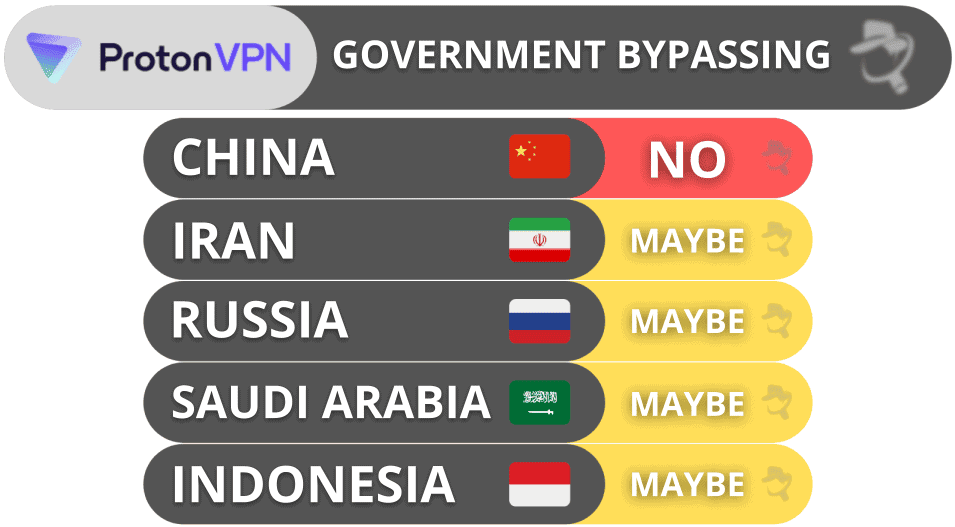
Proton VPN Ease of Use: Mobile & Desktop Apps — Simple to Install on All Devices
Proton VPN offers apps for Android, iOS, Windows, macOS, Linux, Chromebook, Android TVs, Apple TVs, and Fire TVs. It also works on some routers. Downloading and installing Proton VPN is very easy — I added Proton VPN onto my Android and iOS smartphones in about 1 minute, and it took less than 5 minutes to install the app on my Windows and Mac computers.
How to Install Proton VPN (Just 3 Simple Steps):
- Sign up for Proton VPN. Pick a plan and create an account.
- Download and install its apps. Just follow Proton VPN’s on-screen instructions.
- Open the Proton VPN app. Connect to the fastest server in 1 click and start surfing the internet securely.
Android — Quick to Find & Connect to a Server
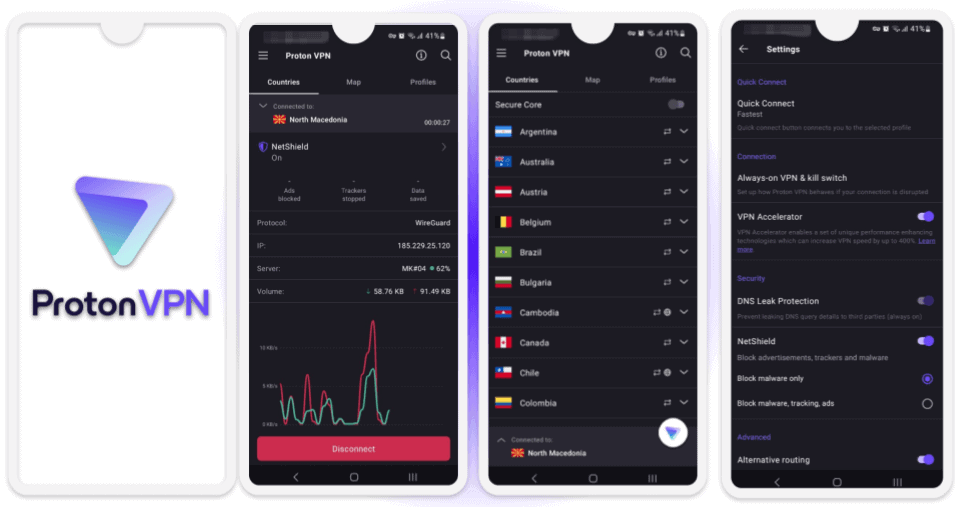
Proton VPN’s Android app is really good — it’s feature-rich, provides fast speeds, and is very easy to navigate.
I really like how easy and quick it is to find a fast Proton VPN server. You can use the Quick Connect option (which automatically connects you to the fastest server by default, but you can also configure it to connect you to a random server) or manually choose a server — Proton VPN indicates each server load percentage with either a green dot (low percentage), yellow dot (medium), or red dot (high). It’s easy to find P2P, Plus, and Tor servers by tapping on the drop-down button that lists all of the servers for each country.
You can also connect to a server using a map, but I don’t recommend this option for Android or iOS — it will take you extra time to find your desired connection point because you will need to zoom in on popular server locations (like Europe).
I really like the app’s “Profiles” option on the main screen. This is where you can create your own connection preferences — you can choose the country you want to connect to, automatically pick the “fastest” server or manually select a specific server, and enable Secure Core and Smart Protocol (which automatically switches you to a different protocol if the default protocol is blocked by a network such as an employer or university).
The kill switch isn’t supported within the Proton VPN app for Android. Instead, there’s an Always-on VPN & kill switch option, where you get instructions on how to enable a permanent kill switch via your phone’s Settings (this means you won’t have access to the internet unless you’re connected to a Proton VPN server).
Finally, there’s a unique “Discreet Icon” option on the Android app, which lets you disguise the VPN app as a weather, notes, or calculator app — a clever addition that can be useful in countries with strict anti-VPN rules where you might face random device inspections by law enforcement.
Overall, I really like Proton VPN’s Android app — it’s very easy to use, has excellent security features, and is easy to customize.
iOS — Well-Designed Interface
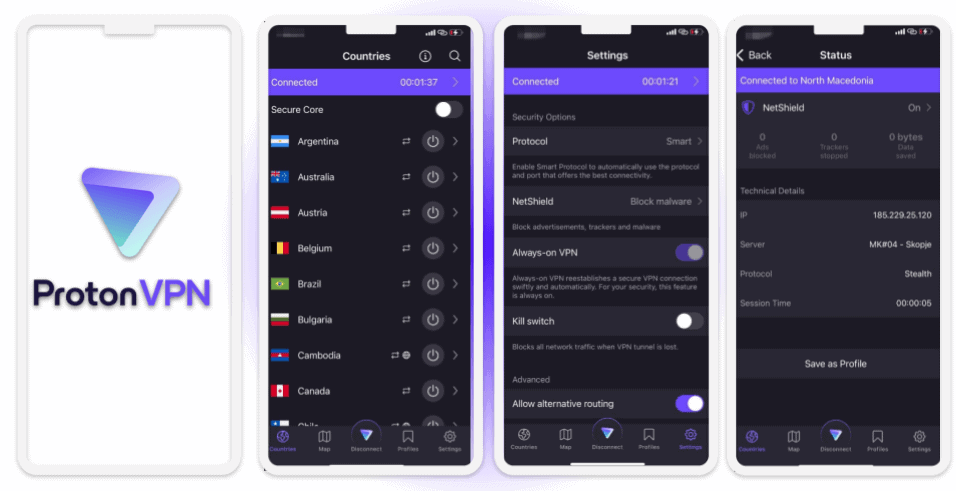
The Proton VPN iOS app is nearly identical to the Android app. The biggest difference is the iOS app doesn’t have split-tunneling. However, most VPNs that have split-tunneling don’t support it on iOS and macOS (except ExpressVPN has split-tunneling for macOS versions 10.15 or under and Private Internet Access has split tunneling for all macOS versions).
I also really love how the iOS app comes with a kill switch option, which is an essential security feature.
Proton VPN’s iOS app is as good as the Android app — it’s well-designed, user-friendly, and includes great security features.
Windows/Mac (Desktop) — Feature-Rich & Customizable
Like the Android and iOS apps, the Windows/Mac apps are very similar to one another. You can connect to a Proton VPN server with just one click by using the Quick Connect tool. When you connect to a server, it’s neat how Proton VPN displays the steps your connection is taking as it’s happening — initializing a connection, authenticating the user, establishing VPN tunnel, and assigning you an IP.
At the top of the window, Proton VPN displays the name of your server (for example, United States > US-NJ#11), your IP address, the load percentage, and your protocol. At the bottom of the screen, Proton VPN displays “Session Traffic” metrics to highlight your network usage and time.
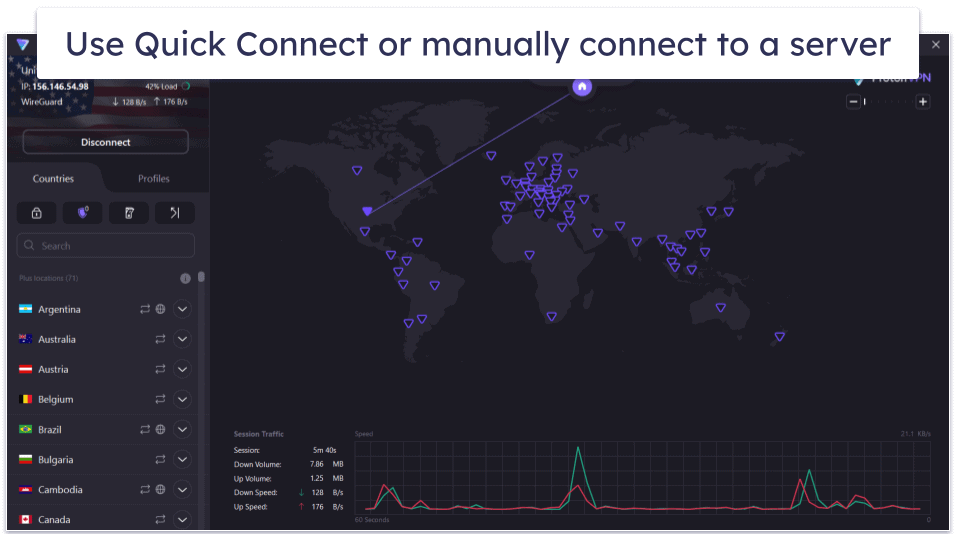
To manually connect to a server, scroll down the list of countries under the Countries tab (or you can select a country on the map). Like with the mobile apps, Proton VPN lists the cities where each server is located and the load percentage is indicated by a green, yellow, or red circle.
I appreciate how Proton VPN keeps it simple to find special servers — the P2P servers are identified by arrows on top of one another pointed in opposite directions, and Tor servers have an onion icon next to them.
The Windows and Mac apps include most of the same features, but there are a couple of small differences. The Windows app doesn’t offer the IKEv2 protocol (you get OpenVPN, WireGuard, and Stealth), and the Mac app doesn’t have split-tunneling.
Overall, the Windows and Mac apps are full-featured, come with a lot of great customization tools, and are very user-friendly.
Routers — Provides Good Configuration Tutorials
You can manually set up Proton VPN on a router, but only if it’s compatible with Proton VPN’s service. Luckily, Proton VPN supports a decent number of router models and firmware — some competitors (like TunnelBear) don’t even allow manual router setups.
Manually setting up a VPN connection on your router is usually difficult — luckily, Proton VPN provides access to helpful step-by-step tutorials that are very easy to follow, so the setup process isn’t very time-consuming (in my case, it took less than 15 minutes to set up Proton VPN on my router).
If you’re willing to pay extra, you can also get an InvizBox 2 router, which is an open-source router that’s tested and configured to easily connect to your Proton VPN account. Proton VPN claims it takes less time to set up the VPN connection using this router, and it also says you get more control over your VPN connection — for example, you can quickly change the VPN server’s location, the VPN server itself, and the VPN protocol (IKEv2/IPSec, OpenVPN over TCP, or OpenVPN over UDP) using dropdown menus inside the router’s dashboard.
But even so, I think ExpressVPN is a much better option if you want to use a VPN on your router because it’s one of the only VPNs to include a router app, which is significantly easier to set up (it only took me 8 minutes to do it) and use thanks to its intuitive interface — plus, the router app uses ExpressVPN’s proprietary Lightway protocol, which is the fastest VPN protocol out there.
Overall, Proton VPN supports manual setups on a decent number of router models and firmware and also provides helpful setup tutorials.
Apple TVs — Easy-to-Use App That’s Great for Streaming
Proton VPN’s Apple TV app is an intuitive app that’s great for Apple TV HD devices and all 3 generations of Apple TV 4K, and it supports streaming.
The app is super simple to install, and I like how you can skip typing out your username and password with the remote when logging in, saving time and hassle. Instead, once you download it from the App Store, it’ll display a code that you’ll need to enter through your Proton account on another device.
The app is very easy to navigate with a remote. You can connect to the fastest server or to any of Proton VPN’s recommended server locations with the tap of a button right on the main screen.
If you’re looking for a specific server location, you can easily browse through the full server list that’s also on the same tab. I also like how all countries with servers are easily recognizable by their flag icons. In my tests, the app ran smoothly, and I never experienced any lag.
However, you need a paid Proton VPN subscription to access Proton’s Apple TV app (it’s not available on the free plan). I’d also like to see it add NetShield to the app — ExpressVPN’s Apple TV app includes its Advanced Protection feature.
Overall, Proton VPN’s Apple TV app provides easy access to all server locations, good streaming support, and seamless navigation on Apple TV.
Browser Extensions (Chromium- & Firefox-Based Browsers) — Offers Extensions for Tons of Browsers
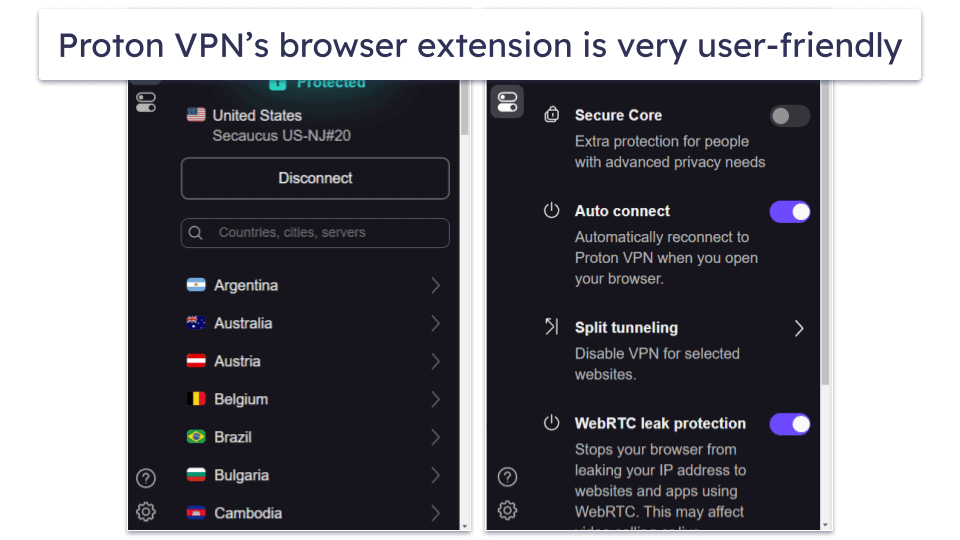
Proton VPN’s browser extensions are great if you only want to protect your browser traffic. The user interface is very intuitive and minimalistic, so you’ll have no trouble connecting to a server or toggling the settings.
I like that the browser extensions list all of the server locations (including cities) available in the other Proton VPN’s apps. You can manually scroll down or use the search function to find a server and click on it to connect.
You get access to Proton VPN’s Secure Core servers and there’s a WebRTC leak protection toggle. The browser extensions provide a split-tunneling function that lets you decide which sites you want to exclude from the VPN tunnel. Plus, there’s an option to set the extension to auto-connect you to a server on launch, so you don’t go online unprotected.
The browser extensions are available on all Chromium-based and Firefox-based browsers, including Google Chrome, Brave, Microsoft Edge, Chromium, Opera, and Vivaldi, as well as Firefox itself, LibreWolf, and Waterfox. This is really convenient considering most top VPNs like ExpressVPN only have browser extension apps for Chrome, Firefox, and Edge.
Overall, Proton VPN’s browser extensions are really good for protecting your web traffic within your browser. They’re available on a long list of popular browsers, include access to Proton VPN’s Secure Core servers and split-tunneling feature, and they’re very user-friendly.
Proton VPN Apps: Is Proton VPN Easy to Use?
Yes, Proton VPN’s apps are really easy to use and full of features, except for the Apple TV app, which is missing almost all features. You get almost all features on all of Proton VPN’s apps, with only a few exceptions — the iOS, macOS, and Linux apps don’t come with split-tunneling, the Linux app is missing the Profiles feature, the Windows app is missing the IKEv2/IPSec protocol, and the Linux app is missing the WireGuard and IKEv2/IPSec protocols. But, other than that, all apps share a very similar design (so it’s really easy to switch between them) and work without any issues.
| Android | iOS | Windows | macOS | Linux | Apple TV |
|
| Graphical User Interface (GUI) | ✅ | ✅ | ✅ | ✅ | ✅ | ✅ |
| Kill Switch | ✅ (manual configuration) |
✅ | ✅ | ✅ | ✅ | ❌ |
| Protocols | WireGuard, OpenVPN (UDP and TCP), Stealth | WireGuard, IKEv2/IPSec, OpenVPN (UDP and TCP), Stealth | WireGuard, OpenVPN (UDP and TCP), Stealth | WireGuard, IKEv2/IPSec, OpenVPN (UDP and TCP), Stealth | OpenVPN (UDP and TCP) | WireGuard |
| Split-Tunneling | ✅ | ❌ | ✅ | ❌ | ❌ | ❌ |
| NetShield | ✅ | ✅ | ✅ | ✅ | ✅ | ❌ |
| Secure Core | ✅ | ✅ | ✅ | ✅ | ✅ | ❌ |
| VPN Accelerator | ✅ | ✅ | ✅ | ✅ | ✅ | ❌ |
| Profiles | ✅ | ✅ | ✅ | ✅ | ❌ | ❌ |
Proton VPN Customer Support — Offers Multiple Platforms (Live Chat Only Available on Paid Plans)
Proton VPN provides a thorough library of support guides and a support form, and a live chat.
Their support documentation is comprehensively detailed, spanning 7 main categories. Most of my questions were quickly addressed within these sections. If the answer wasn’t immediately visible, the search functionality pinpointed the needed solution in no time.
Its email support (via the ticketing system) is average at best. I received a reply after a day, which isn’t terrible, but most premium VPNs respond in less than 24 hours. Nevertheless, the responses from the reps were thorough and useful.
But I like that it has a live chat option, as it’s the easiest and fastest way to find an answer to questions that I can’t find in the support library and resolve any problem I might have with the VPN. The live chat is only available for paid users and the representatives are only available Monday through Friday between 9 am–12 pm CEST. Top providers like ExpressVPN and Private Internet Access have a 24/7 live chat option that anyone can use.
I contacted Proton VPN via email to request my refund. It was hassle-free, and the money was added back onto my credit card in 5 days.
Overall, I like Proton VPN’s customer support. It has a comprehensive support library that I found to be extremely useful, and offers both email and live chat assistance. My primary gripe with the live chat was its limited availability during specific hours only. However, both the live chat and email support staff excelled in addressing all of my queries and they were super friendly, too.
What Proton VPN Can Do Better — Work in Restricted Countries + Offer Live Chat to All Users
Proton VPN is a standout VPN, but it can use improvement in some areas. For example, it doesn’t work in restrictive countries, live chat is only available for paid users and isn’t available 24/7, and it’s missing some additional features that the best VPNs (like ExpressVPN) offer.
First, I’m disappointed that Proton VPN can’t be used in countries like China and only maybe works in countries like Indonesia and Russia. Unfortunately, Proton VPN’s obfuscation isn’t good enough to work in highly restrictive countries, even though it does work for bypassing ordinary internet restrictions.
Proton VPN’s customer support is mostly excellent, but I don’t like how its live chat isn’t available 24/7, and you have to be a paid subscriber to use it — users on the free plan and potential customers with questions must use the email service. Almost all VPNs with live chat are available at any time of day or night, which is really convenient. So, I’d like to see the VPN extend its live chat support hours in the future.
Plus, Proton VPN is also missing a smart DNS tool, which means you won’t be able to use the VPN on devices that don’t have native VPN support. This includes certain smart TVs and gaming consoles like Xbox and PlayStation. All top VPNs, such as Private Internet Access, have this tool to improve their streaming support and device compatibility.
Is Proton VPN Good for Security & Privacy?
Proton VPN is a really good VPN. It provides great security features, is very easy to use, has really good speeds, works with top streaming services like Netflix, BBC iPlayer, and Hulu, supports P2P file sharing on dedicated servers, and allows up to 10 connections.
When it comes to security and privacy, it’s difficult to top Proton VPN. It has standard security features like 256-bit AES encryption, a kill switch, and fast and secure protocols, but Proton VPN also includes extras like Secure Core (double VPN routing), NetShield (ad/tracking blocker), Proton Pass, Tor over VPN, open-source apps that have been independently audited, and advanced features like perfect forward secrecy, full-disk encryption, and full leak protection. Proton VPN has a strict no-logs policy and is based in privacy-friendly Switzerland, which doesn’t have mandatory data-retention laws and is located outside the 5/9/14 Eyes Alliances.
In my speed tests, Proton VPN was fast and provided really good connection speeds for browsing, watching videos and streams, torrenting, and gaming. Thanks to VPN Accelerator (increases VPN speeds), websites took only 1–2 extra seconds to load, even on the most distant servers.
But Proton VPN isn’t perfect. I’m disappointed that Proton VPN doesn’t work in restrictive countries like China. Also, it’s missing a smart DNS for devices that don’t support VPN apps — ExpressVPN has all of the above.
All that said, Proton VPN has a good free VPN plan, and all of its paid plans are backed by a prorated 30-day money-back guarantee.
Frequently Asked Questions
Is Proton VPN safe?
Yes, Proton VPN provides really strong security. In addition to industry-standard security features like 256-bit AES encryption, a kill switch, and a strict no-logs policy, Proton VPN includes extra features like Secure Core servers (double VPN routing), NetShield (an ad/tracking blocker), perfect forward secrecy (changes your encryption key after each session), and much more.
Is Proton VPN free?
Yes, Proton VPN has a free plan, which is actually pretty good. The best part about Proton VPN’s free plan is that it doesn’t set a limit on your data — most free VPNs come with data caps. However, the free plan only allows you to connect 1 device, gives you access to 5 server locations (the Netherlands, Japan, the US, Romania, and Poland), and doesn’t come with streaming and P2P support. To get all of that and more, you’ll need to upgrade to one of Proton VPN’s paid plans, which are affordable and are all backed by a prorated 30-day money-back guarantee.
Does Proton VPN work with Netflix?
Yes, Proton VPN works with Netflix, and it’s compatible with 25 Netflix libraries. But it’s important to note that Proton VPN only supports streaming on its premium plans — Netflix won’t work on the free servers.
Does Proton VPN work on Android + iOS?
Yes, in fact, Proton VPN has great mobile apps. They both have an intuitive interface, 1–2 tap connections, fast speeds, and include WireGuard, OpenVPN, and Stealth (the provider’s proprietary protocol that has obfuscation). The iOS app also offers the IKEv2/IPSec protocol as an option — the only drawback with the iOS app is it doesn’t have split-tunneling (most iOS VPNs don’t).
Is Proton VPN good for torrenting?
Yes, Proton VPN has good P2P support — it allows torrenting on servers in 16+ countries, works with all the popular P2P clients, comes with port forwarding to help you increase your download speeds, and provides great security while torrenting via full leak protection, a kill switch, and an ad blocker.
That said, my favorite P2P VPN is ExpressVPN because it provides better P2P support — it allows torrenting on servers in 105 countries, and also has much faster download speeds than Proton VPN.
Can Proton VPN be used in China?
Unfortunately, no — the provider is not able to consistently work in China, despite it coming with obfuscation, which hides VPN traffic.
If you need a secure VPN that works in restrictive countries like China, I recommend ExpressVPN — it provides obfuscation across all of its servers, and it also has high-end security and privacy features.
Can Proton VPN be installed on a Fire Stick?
Yes, as Proton VPN has a dedicated Fire TV app that you can download and install from the app store. Proton VPN’s Fire Stick app is really intuitive and simple to navigate with a remote, comes with NetShield (blocks ads and malicious sites), and is also open-source — its code has been independently audited and proven to be safe.
Does Proton VPN slow down your speeds?
All VPNs slow down your speeds due to the encryption-decryption process and how long it takes for data to travel between your device and the VPN server. That said, Proton VPN minimizes the speed loss (so that it’s not noticeable) thanks to its speed-optimized servers, fast protocols, and VPN Accelerator, which uses speed-enhancing technologies to increase your VPN speeds across all servers.
But despite all of that, Proton VPN still isn’t as fast as ExpressVPN, which is currently the fastest VPN in 2024 thanks to its proprietary protocol called Lightway (which has lightning-fast speeds, is open-source, and provides excellent security).

